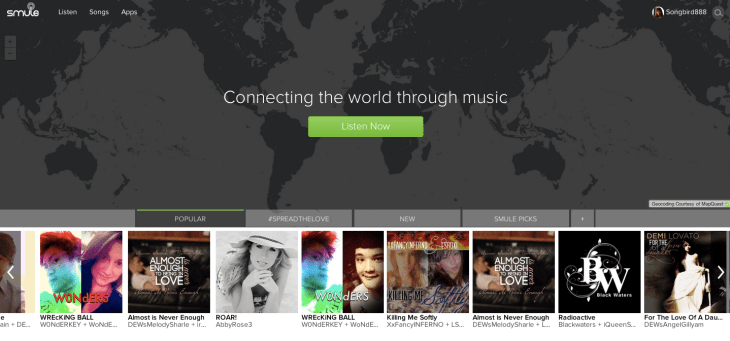Smule has launched a number of popular, music-themed mobile apps, including Sing! Karaoke, Guitar, Ocarina, Magic Piano, and I Am T-Pain. Now it’s turning its website into a social network that it calls Smule Nation, highlighting performances from across all of its apps.
The apps have always emphasized sharing. One of the posts that I wrote about Smule’s first hit, Ocarina, highlighted YouTube videos of some of the best performances. But that also points to one of the things that was lacking: If users wanted to share their performances, they had to do it within the apps themselves or go outside Smule altogether.
Now, with Smule Nation, the company can highlight the best performances across all of its apps. The website includes a section for the most popular music across the network, as well as the company’s curated picks. If you find a performer you like, you can visit their profile page to see other performances and follow them to get updates when they add new content. Those performers, meanwhile, get a unified presence for their work across the various apps, and if they want to share content, they can now just share a link.
Co-founder and CEO Jeff Smith said Smule previously had a website with some basic social features, but he characterized this as the first serious social push (certainly the web has never been a significant part of Smule’s promotional efforts before this).
Smith, along with Chief Product and Design Officer Jeannie Yang, gave me a tour of the new website, and it seemed like one of their main goals was to highlight the amount of activity that’s already happening in the apps. Sing! Karaoke users are singing more than 20,000 songs per hour, they said, while Magic Piano Users are playing more than 50,000. And Sing!, for example, has actually connected groups of performers (yes, with band names and everything) who never met in real life.
Overall, the company says more than 125 million users have shared more than 1 billion songs. Much of that content, Smith said, is “not especially good,” but he suggested that, as users listen to and promote the performances, “Eventually some good content rises to the top.” As that happens, he suggested that the site could become a destination for the discovery of new music — and since it’s all user-generated content, it doesn’t have the big costs of other music services.
Despite that bigger vision, Smith said he has no plans to make money directly from Smule Nation. Instead, he sees it as a way to unify and promote the apps. You’ll still need those apps to create the performances highlighted on the site. Smith said he is interested in doing more on the web over time, but there are some features that “we will only ever be able to do natively.”
